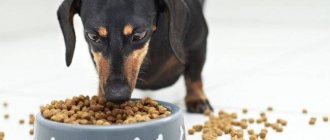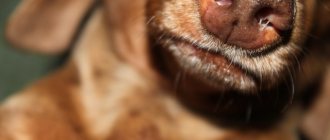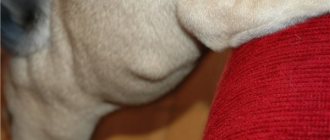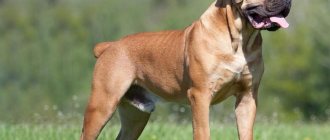The dog's pregnancy period is a crucial period for the owner, during which he needs to create safe, comfortable conditions for her, as well as correctly create a daily menu. The food that the owner offers to his pregnant dog must meet the increased needs of her body and provide nutrients to the growing, developing puppies.
Basic principles of diet planning
When a dog is going through such an important period in its life, it is advisable to protect it from all kinds of stress and drastic changes. This also applies to the menu during pregnancy.
The diet must be compiled taking into account certain principles, following which will ensure a comfortable pregnancy for the dog and healthy puppies:
- Feeding should remain as it was before pregnancy: either industrial food or natural products.
- You should not mix ready-made food with homemade food, much less feed your dog from the table.
- You can only change the brand of finished food to a higher quality one: super-premium or holistic class.
- In the daily diet of a pregnant dog, biases towards any one nutritional element are unacceptable. It must necessarily include proteins, fats and carbohydrates.
- The calorie content and nutritional value of the diet during pregnancy and feeding puppies must be increased.
- At the same time, feeding should not lead to excessive weight gain. Due to overfeeding, metabolism is disrupted, puppies can become too large, which will significantly complicate the birth process.
Human food for a nursing dog
As for occasional human food, it is a treat served in moderation rather than a balanced diet for your lactating dog for 2 reasons: His caloric and nutrient needs are high enough to include supplemental food, as long as it contains plenty of nutrients ; and because nutrient requirements are based on the dry mass of the total diet. Because the dry weight of human food treats is typically low, moderate amounts may not compete with the nutrient balance of your pet's regular diet. Rather, they can promote milk production and provide your mama dog with a tasty break from routine. Approved nutrient-dense human foods include cheese and yogurt, cooked chicken, oatmeal, green beans, pumpkin and carrots, peanut butter, salmon and eggs—all of which are generally favorites for dogs.
When to adjust your diet
Changes in the usual diet do not have to be made immediately after mating. During the first weeks, the dog may suffer from toxicosis. The consequence of this is a decrease in appetite. Improvement in well-being will occur at the end of the first month, and then you need to review the menu in order to increase its calorie content and volume. The amount of feed should be increased gradually: every week by about 15%. By the end of pregnancy, the amount of food eaten should be 60% more than at the beginning.
It is necessary that the amount of nutrients supplied with food is sufficient for the full formation of the organs and systems of the fetus or several embryos without harming the body of the pregnant bitch.
Those dogs that eat natural foods definitely need additional vitamin and mineral supplements. You can start administering them from the very beginning of pregnancy or before its onset in order to prevent hypovitaminosis.
Pets kept on ready-made industrial feeds are switched to specialized mixtures for whelping or lactating bitches from the fifth week of pregnancy. It must be remembered that when feeding dry food, clean water should always be available. This food tends to swell in the intestines, causing constipation.
By the 40th day of pregnancy, the puppies in the womb have grown significantly, and the stomach is compressed. At this time, the dog needs to be fed up to 5 times throughout the day, dividing the daily amount of food between all feedings. At the same time, single servings are reduced.
Starting from the seventh week of pregnancy, approximately 50 days, the dog prepares for childbirth. To facilitate this process, reduce the intake of protein products from food, reducing their volume. It is also better to avoid additional calcium intake at this time.
Nutrition rules
All food you feed your pregnant dog should be easy to digest. Nutrients should be accessible and portions small. A bowl of fresh water should be readily available.
If the animal eats ready-made food, vitamin and mineral premixes are not needed. You should consult your veterinarian before administering any supplements.
Regardless of whether you feed your dog natural food or commercial food, the diet remains the same in the first four weeks. In the fifth week (from the 30th day of pregnancy) you can already notice changes in the physical condition and behavior of the pet. It is during this period that the diet begins to gradually change. At the same time, physical activity is significantly reduced. You need to walk your dog a lot, but at a calm pace.
Nutritional needs of a dog during pregnancy and feeding puppies
A pregnant dog's daily menu should contain a lot of protein. They serve as building material in the formation of the growing organisms of future puppies.
Fats are organic substances that are part of all cells. Their main role is to provide energy and absorb important components from food. For example, the most important vitamins A, D, and E during pregnancy are fat-soluble. A sufficient intake of fats from food will reduce heat transfer and protect the dog’s body from hypothermia. The appearance of a small layer of fat during pregnancy is normal.
The main source of energy for a dog is carbohydrates. In a pet's diet, sources of carbohydrates include porridges made from various types of cereals. You can add a few drops of vegetable oil to them. The predominant type of cereal is millet. It contains a lot of B vitamins, which dogs often lack.
Feeding your pet after birth depends on a number of factors:
- individual characteristics and needs;
- dog activity;
- number of puppies born.
Over the course of a month, while the puppies feed on their mother's milk, her appetite will increase. During lactation, highly nutritious natural food is required. To produce milk, replenish energy costs and maintain immunity, a dog may need 4 times more food than before pregnancy. Puppies begin to be separated from their mother at 5-6 weeks after birth.
Diet
The amount of starchy foods - cereals and flour products - should remain the same as before pregnancy.
As the bitch’s body weight increases, her daily diet is divided into several meals. You will need to feed her twice a day at first, then three times, then four times if she is expected to have large litters.
In overweight bitches, childbirth is often difficult, therefore, if a pregnant dog is prone to obesity, the amount of cereals in its diet should be reduced. Vegetables can be used as a supplement that does not lead to obesity.
During pregnancy, the mother dog’s body should receive a particularly large amount of proteins, vitamins and elements, primarily calcium. These substances are extremely necessary for the health of future puppies and to protect the body of a pregnant dog from exhaustion. However, you should not introduce vitamin supplements into her diet yourself, since a very precise dosage is needed here.
Any mistake can lead to serious health problems for the dog and its puppies. Only a veterinarian can correctly calculate the dosage, and he can also recommend specific vitamin supplements. In general, during pregnancy the required amounts of nutrients and vitamins increase.
Feeding a pregnant dog should be done with high-quality ready-made food or high-quality home-cooked food. The daily diet should fully provide the body with fats, proteins, carbohydrates, minerals, and vitamins. The main role is played by the quality of food, which is more important than quantity.
100 g of food for a pregnant dog should contain:
- 22 g proteins;
- 5 g fat;
- 0.9 g phosphorus;
- 1.1 g calcium;
- 0.6 g potassium;
- 1.1 g sodium chloride;
- 0.7 g copper;
- 0.04 g magnesium;
- 0.2 g iodine;
- 0.5 g zinc;
- 0.01 g selenium;
- as well as vitamins A, E, D and group B.
Sources of energy for dogs are proteins of both animal and plant origin, carbohydrates and fats. The dog's body easily digests fructose and glucose. A significant proportion of dogs do not digest lactose well, which leads to gastrointestinal disorders.
If before pregnancy the dog ate, for example, Yorkie concentrates, then during whelping its diet should contain meat (but not pork and lamb), offal (from healthy animals), fresh eggs, vegetables, fruits, cereals, brewer's yeast, vitamins and minerals additives. Raw egg yolks are very useful. For very small bitches, two yolks per week will be enough; for large bitches, the same amount is needed for just one meal. Only the yolk can be given to the dog raw, and the entire egg should be served boiled or as an omelet.
Crude protein contains avidin, which binds biotin, which is produced in the intestines by bacteria. Thus, if a pregnant dog is fed too much raw eggs (or egg whites alone), it will end up with a biotin deficiency, which can significantly affect the condition of the coat. A boiled egg contains as much protein as 56 g of quality meat.
Interesting to know! It should be remembered that bitches often change their food preferences during pregnancy, so the dog may come to like foods that it did not like, and vice versa, reject previously loved ones. Therefore, you need to diversify her diet as much as possible.
Not all foods should be soft; you should definitely give something that you have to chew, for example, carrots, apples and meat on a large bone, otherwise tartar will be deposited on the teeth.
Proteins, fats and carbohydrates
Pregnant bitches need food with a high protein content, since proteins are the main building material for the body. Proteins are found in all tissues of animals, plants and fungi. They consist of carbon, hydrogen, oxygen, sulfur and nitrogen.
The protein deficiency in the body can be compensated for by adding increased amounts of meat, cottage cheese, milk, fish, cabbage, wheat bran, soybeans, potatoes, and grain germs to the diet. A fairly economical protein food is fish, in particular fresh or frozen sea fish, such as sprat or herring. Sprat can be given raw. It is necessary to remove the tails and heads, grind the fish in a meat grinder and mix them with vegetables or cereals. The rest of the fish must be cooked until all its bones are cooked.
Fats are organic substances that are part of the tissues of all living beings. The main components of fats are glycerin, acid, hydrogen, and carbon.
The breakdown of fats produces 2-3 times more heat than the breakdown of carbohydrates and proteins, so they can be considered a good energy source. They have a beneficial effect on the endocrine and nervous systems. Fat, deposited under the skin, reduces heat transfer from the body, making it easier for the dog to tolerate cold. This is true when the dog is kept outside.
Carbohydrates also play an extremely important role for the dog’s body. Quantitatively, carbohydrates make up the largest portion of a dog’s diet. They have energy value and participate in the synthesis of fatty acids, proteins and other compounds needed by the body.
Although carbohydrate metabolism changes little during pregnancy, the dog’s body as a whole reacts quite sensitively to changes in the amount of incoming microelements: their lack forces the liver to release reserve glycogen, which stimulates the work of muscle and nervous tissue, and also serves as a barrier that protects it from toxic substances.
Milk contains many carbohydrates. In milk they have the form of lactose - milk sugar. Fiber is also a carbohydrate, which is abundant in cereals and vegetables. It promotes the synthesis of B vitamins in the dog’s intestines. When entering the intestines, fiber stimulates its work and serves as an effective means of preventing constipation. But if a dog is overfed with food containing fiber, the animal experiences diarrhea.
Water
Water is very important for the normal development of the embryo. This is the main component of the dog’s body, amniotic fluid, placenta.
From the very first days of pregnancy, the animal must be given drinking water without restrictions, since its body produces amniotic fluid, which is contained in the water bladders that protect the embryos.
Excess fluid leads to increased secretion from the body. At the same time, many minerals come out along with the water, the loss of which is very dangerous. When there is excess fluid in a pregnant bitch, the kidneys and heart become overloaded.
Minerals
The dog's body is not able to function normally without minerals, which are very important during pregnancy for the formation of the embryo.
Calcium and phosphorus are involved in the metabolism of all substances; they make up bone tissue and hormones. Phosphorus and calcium increase enzyme activity and the body's resistance to various infectious diseases. Deficiency of calcium and phosphorus leads to thinning of bones and their curvature, as well as increased fragility, destruction of tooth enamel and discoloration, and hair loss. In severe cases, clouding of the eye lens occurs. During pregnancy, the required amount of these substances increases 4 times.
Bitches who have not consumed enough of these substances often experience delayed births, and puppies are often born sick.
Dairy products contain many vitamins, phosphorus and calcium, so pregnant bitches should be given as much of them as the dog wants, if this does not lead to digestive disorders. 0.5 liters of kefir or yogurt contains protein in the same amount as it is contained in 85 g of meat.
Chlorine and sodium are found both in the cells of the body and in the extracellular fluid. They are found in the body in the form of salt - sodium chloride. When preparing food for pregnant and lactating dogs, it is advisable to add a little salt. Sodium chloride is found in large quantities in fish, milk and meat, while there is little of it in vegetables and cereals.
Microelements also have a strong effect on metabolism. For example, magnesium is part of bone tissue and is involved in protein synthesis. Iron is involved in the formation of blood cells. Iron deficiency in the diet of a pregnant dog leads to the birth of weakened puppies.
Vitamins
These are biological catalysts that are part of hormones and enzymes. During pregnancy, the required amount of vitamins triples. If a pregnant bitch lacks vitamins, consuming unbalanced and low-quality dog food, her labor is accompanied by increased stress, and there are often pathologies in the offspring. Vitamins improve metabolism, facilitate pregnancy and embryo development.
Also, in addition, dry food for pregnant dogs should contain fish oil with its fat-soluble vitamins. Most vitamins enter the dog's body as part of food, only some are synthesized in the body itself.
The best cereal for dogs is wheat, since it contains B vitamins in the largest quantities. It is the vitamins of this group that dogs most often lack. A lot of these vitamins are contained in brewer's yeast, so pharmaceutical preparations consisting of them can be added to food for pregnant dogs. Vitamin C usually does not need to be added to dog food even during pregnancy, but sometimes its content in the body becomes insufficient. Then additional introduction is required.
Currently reading:
- Seven Signs and Remedies for Getting Rid of Fleas in Dogs
- Thyroid dysfunction in dogs (hypothyroidism)
- Is it worth it or not to include natural food in your dog’s diet?
- What to do if your dog has an abnormal bite
Features of a menu made from natural products
With a natural diet, the majority are protein products: high-quality lean meats - veal, chicken, turkey, offal (liver, tripe). It is better to boil them for a few minutes before using. Another healthy source of protein is sea fish.
Milk, cottage cheese, and natural yogurt will also benefit a pregnant pet. It is better to give preference to fermented milk products, since many dogs are intolerant to lactose (milk sugar), which is found in excess in cow's milk.
You can offer raw egg yolks twice a week. They are able to enrich the body with vitamins A, D, and folic acid. It is not recommended to feed raw protein - it contains avidin, which interferes with the absorption of biotin in the intestines. Biotin is one of the B vitamins. It ensures normal sebum production, which has a beneficial effect on the dog's coat.
Vegetables and fruits are a source of fiber. Regular intake is a good prevention of constipation. You should not include cabbage, legumes, or potatoes in your diet. This can lead to bloating and indigestion.
All products offered to a pregnant dog must be of high quality and completely safe. With a balanced diet, the dog does not need additional artificial food additives in the diet. But it is quite difficult for the owner to achieve this on his own. Therefore, vitamin-mineral complexes are always required for natural feeding.
Required Components
The proportion and compatibility of vitamins is selected by the veterinarian.
Usually prescribed:
- A complex of vitamins A, B9, E. Helps to better cope with pregnancy. Folic acid helps maintain cellular structure and is responsible for the formation of new tissues, preventing the development of congenital pathologies.
Omega-3. Fatty acids take care of the formation of immunity, vision and nervous system of the offspring.- C. Ascorbic acid strengthens the mother’s body, preventing the penetration of viruses and infections.
- Iron. Required to prevent anemia.
- Calcium. Strengthens bones and teeth.
- B vitamins. Various components are responsible for the functioning of the cardiac and nervous systems, and tissue regeneration.
Complexes for small breed dogs
Small breed animals are not recommended to take fish oil, as this can lead to obesity. They benefit from calcium complexes.
Vitamins that have worked well:
- Wolmar Pro Bio Booster ca mini. The Swiss product is quickly absorbed and contains the necessary amino acids, vitamins, and calcium. Probiotics help normalize intestinal microflora and metabolism.
- 8 In 1 Excel Daily. The German product has a number of lines designed for any age and needs of a dog. Excel Daily includes fish meal, crushed wheat germ, glycerin, milk powder, B vitamins. These components provide dogs with adequate nutrition and a healthy pregnancy.
Vitamins for medium-sized animals
The following remedies are prescribed:
- Gelakan (can be given in the second half of the term, the complex is recommended for small puppies starting from 1.5 months of age and for dogs of medium breeds when bearing offspring; the Czech drug takes care of the health of bones, ligaments and joints; with long-term use, collagen hydrolyzate can completely normalize the condition of cartilage, since it is their integral component).
- Beaphar (a Dutch drug with a wide range of applications, it contains vitamins E, D, A, B, minerals, L-carnitine; the product helps strengthen the heart, skeleton, immunity, muscles, increases tone, improves metabolism, the condition of the skin and coat) .
Complexes for large species
Due to the significant weight during gestation, dogs' bone structure and joints suffer. When choosing medications for large breeds, you should pay special attention to this fact.
Appointed:
- Biorhythm . The best Russian drug, suitable for bitches weighing more than 30 kg. The composition includes collagen hydrolyzate, which allows you to take care of problem areas at this stage. The line has the formulas “Morning” and “Evening”. The first increases tone, immunity, energizes, supports the nervous system, heart, teeth, bones. Evening form takes care of the health of the liver, kidneys, circulatory system, coat, improves metabolism and absorption of substances.
- Excel 8 In 1 Brewer's Yeast . Saturates the body of pregnant bitches with all the necessary components. German quality is visible already a few weeks after the introduction of the feed.
- Unitabs Brevers Complex C Q10 . The German drug helps improve metabolism, coat condition, tissue regeneration, and blood circulation. Selenium and zinc accelerate hair growth and prevent hair loss. After using the complex, the skin becomes smooth and well-groomed. Coenzyme Q10 is responsible for heart function, healthy teeth and gums. Vitamin C strengthens the immune system.
The need for vitamins and minerals
If the dog has not started eating significantly more, she may have one or two puppies in the womb. The amount of feed may increase slightly, but macro- and microelements in its composition should still be present in a higher volume than before pregnancy.
Pharmaceutical drugs are not always well balanced in their composition. It is better to give preference to monovitamins and feed the dog with one vitamin.
One of the main minerals during pregnancy is calcium. With its participation, the formation of bones and teeth in puppies occurs. But in order for it to be well absorbed by the body, a sufficient amount of other elements is necessary. In this process, calcium and phosphorus complement each other, and vitamin D promotes the absorption of calcium in the intestines. It must be remembered that an imbalance between calcium and phosphorus leads to the removal of calcium and weakening of bone tissue.
Magnesium is also an important element, which helps the functioning of the central nervous system.
An excess of vitamins and minerals is no less dangerous than their deficiency. Hypervitaminosis can cause developmental defects in developing embryos. Before choosing mineral complexes and their dosage, you should consult your veterinarian.
Should I give vitamins?
Breeders are interested in the question of whether supplements are needed if the animal eats special food. The period of pregnancy and lactation requires a special attitude towards the dog, and even with a balanced diet, some necessary components may be missing.
When breastfeeding, vitamin supplementation is especially required. When selecting medications, pay attention to the breed of the dog. In small animals, metabolism is accelerated, and the need for vitamins is higher than in large females.
Why do dogs need supplements during pregnancy?
During pregnancy, a number of changes occur in a dog's body.
All accumulated nutrients go towards the growth and development of puppies, so the mother may lack a specific vitamin or group of nutrients.
A properly selected vitamin complex allows you to replenish the loss and provide the necessary supply for the offspring.
Summing up
- The diet of a pregnant dog should be based on meat products. If you feed her good dry food, you can stay on it, but the daily dosage will have to be increased.
- Any complete food already contains all the vitamins and minerals the body needs in optimal proportions. There is no need to add anything other than clean drinking water to it unless otherwise recommended by your veterinarian.
- If you are just planning a dog’s pregnancy, it is wise to switch it to a high-quality commercial diet in advance: this will prevent many problems and help you get healthy offspring.











